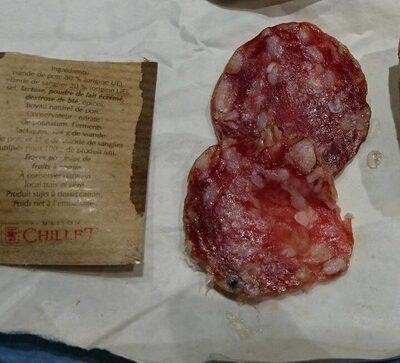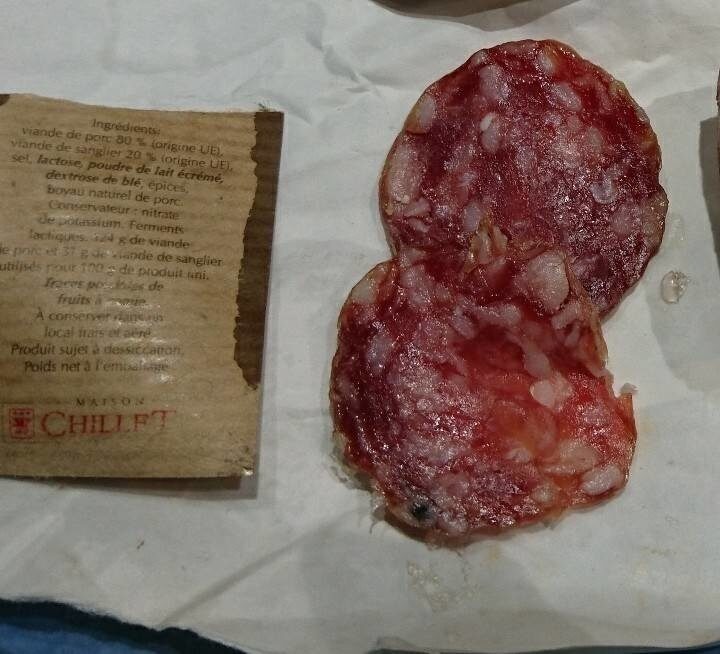Help us make food transparency the norm!
As a non-profit organization, we depend on your donations to continue informing consumers around the world about what they eat.
The food revolution starts with you!
Saucisson sec de porc et de sanglier - Chillet - 200g
Saucisson sec de porc et de sanglier - Chillet - 200g
This product page is not complete. You can help to complete it by editing it and adding more data from the photos we have, or by taking more photos using the app for Android or iPhone/iPad. Thank you!
×
Barcode: 3234818071045 (EAN / EAN-13)
Common name: Préparation charcutière à base viande de porc et sanglier
Quantity: 200g
Brands: Chillet
Categories: Meats and their products, Meats, Prepared meats, Cured sausages, Dry sausages
Origin of ingredients: Europe
Manufacturing or processing places: Saint Symphorien sur Coise
Traceability code: FR 69.238.004 CE - Saint-Symphorien-sur-Coise (Rhône, France)
Countries where sold: France
Matching with your preferences
Health
Ingredients
-
15 ingredients
: Viande de porc 80% (Origine UE), viande de sanglier 20% (Origine UE), sel, lactose, poudre de lait écrémé, dextrose de blé, épices, boyau naturel de porc, conservateur : nitrate de potassium, ferments lactiques, poudre de fleurage : talc, carbonate de calcium, sorbate de potassiumAllergens: Gluten, MilkTraces: Nuts
Food processing
-
Ultra processed foods
Elements that indicate the product is in the 4 - Ultra processed food and drink products group:
- Additive: E170 - Calcium carbonates
- Ingredient: Dextrose
- Ingredient: Glucose
- Ingredient: Lactose
Food products are classified into 4 groups according to their degree of processing:
- Unprocessed or minimally processed foods
- Processed culinary ingredients
- Processed foods
- Ultra processed foods
The determination of the group is based on the category of the product and on the ingredients it contains.
Additives
-
E170 - Calcium carbonates
Calcium carbonate: Calcium carbonate is a chemical compound with the formula CaCO3. It is a common substance found in rocks as the minerals calcite and aragonite -most notably as limestone, which is a type of sedimentary rock consisting mainly of calcite- and is the main component of pearls and the shells of marine organisms, snails, and eggs. Calcium carbonate is the active ingredient in agricultural lime and is created when calcium ions in hard water react with carbonate ions to create limescale. It is medicinally used as a calcium supplement or as an antacid, but excessive consumption can be hazardous.Source: Wikipedia
-
E202 - Potassium sorbate
Potassium sorbate (E202) is a synthetic food preservative commonly used to extend the shelf life of various food products.
It works by inhibiting the growth of molds, yeast, and some bacteria, preventing spoilage. When added to foods, it helps maintain their freshness and quality.
Some studies have shown that when combined with nitrites, potassium sorbate have genotoxic activity in vitro. However, potassium sorbate is generally recognized as safe (GRAS) by regulatory authorities.
-
E252 - Potassium nitrate
Potassium nitrate: Potassium nitrate is a chemical compound with the chemical formula KNO3. It is an ionic salt of potassium ions K+ and nitrate ions NO3−, and is therefore an alkali metal nitrate. It occurs in nature as a mineral, niter. It is a source of nitrogen, from which it derives its name. Potassium nitrate is one of several nitrogen-containing compounds collectively referred to as saltpeter or saltpetre. Major uses of potassium nitrate are in fertilizers, tree stump removal, rocket propellants and fireworks. It is one of the major constituents of gunpowder -black powder- and has been used since the Middle Ages as a food preservative.Source: Wikipedia
Ingredients analysis
-
Palm oil free
No ingredients containing palm oil detected
-
Non-vegan
Non-vegan ingredients: Pork meat, Wild board meat, Lactose, Skimmed milk powder, fr:Boyau naturel de porc
-
Non-vegetarian
Non-vegetarian ingredients: Pork meat, Wild board meat, fr:Boyau naturel de porc
-
Details of the analysis of the ingredients
: Viande de porc 80%, viande de sanglier 20%, sel, _lactose_, poudre de _lait_ écrémé, dextrose de _blé_, épices, boyau naturel de porc, conservateur (nitrate de potassium), ferments lactiques, poudre de fleurage (talc), carbonate de calcium, sorbate de potassium- Viande de porc -> en:pork-meat - vegan: no - vegetarian: no - ciqual_proxy_food_code: 28205 - percent_min: 80 - percent: 80 - percent_max: 80
- viande de sanglier -> en:wild-board-meat - vegan: no - vegetarian: no - ciqual_food_code: 14002 - percent_min: 20 - percent: 20 - percent_max: 20
- sel -> en:salt - vegan: yes - vegetarian: yes - ciqual_food_code: 11058 - percent_min: 0 - percent_max: 0
- _lactose_ -> en:lactose - vegan: no - vegetarian: yes - percent_min: 0 - percent_max: 0
- poudre de _lait_ écrémé -> en:skimmed-milk-powder - vegan: no - vegetarian: yes - ciqual_food_code: 19054 - percent_min: 0 - percent_max: 0
- dextrose de _blé_ -> en:wheat-dextrose - vegan: yes - vegetarian: yes - ciqual_proxy_food_code: 31016 - percent_min: 0 - percent_max: 0
- épices -> en:spice - vegan: yes - vegetarian: yes - percent_min: 0 - percent_max: 0
- boyau naturel de porc -> fr:boyau-naturel-de-porc - vegan: no - vegetarian: no - percent_min: 0 - percent_max: 0
- conservateur -> en:preservative - percent_min: 0 - percent_max: 0
- nitrate de potassium -> en:e252 - vegan: yes - vegetarian: yes - percent_min: 0 - percent_max: 0
- ferments lactiques -> en:lactic-ferments - vegan: maybe - vegetarian: yes - percent_min: 0 - percent_max: 0
- poudre de fleurage -> en:anti-caking-agent - percent_min: 0 - percent_max: 0
- talc -> en:e553b - vegan: yes - vegetarian: yes - percent_min: 0 - percent_max: 0
- carbonate de calcium -> en:e170i - vegan: maybe - vegetarian: maybe - percent_min: 0 - percent_max: 0
- sorbate de potassium -> en:e202 - vegan: yes - vegetarian: yes - percent_min: 0 - percent_max: 0
Nutrition
-
Bad nutritional quality
⚠ ️Warning: the amount of fruits, vegetables and nuts is not specified on the label, it was estimated from the list of ingredients: 0This product is not considered a beverage for the calculation of the Nutri-Score.
Positive points: 0
- Proteins: 5 / 5 (value: 25, rounded value: 25)
- Fiber: 0 / 5 (value: 0, rounded value: 0)
- Fruits, vegetables, nuts, and colza/walnut/olive oils: 0 / 5 (value: 0, rounded value: 0)
Negative points: 25
- Energy: 5 / 10 (value: 1774, rounded value: 1774)
- Sugars: 0 / 10 (value: 0, rounded value: 0)
- Saturated fat: 10 / 10 (value: 14, rounded value: 14)
- Sodium: 10 / 10 (value: 1800, rounded value: 1800)
The points for proteins are not counted because the negative points are greater or equal to 11.
Nutritional score: (25 - 0)
Nutri-Score:
-
Nutrient levels
-
Fat in high quantity (36%)
What you need to know- A high consumption of fat, especially saturated fats, can raise cholesterol, which increases the risk of heart diseases.
Recommendation: Limit the consumption of fat and saturated fat- Choose products with lower fat and saturated fat content.
-
Saturated fat in high quantity (14%)
What you need to know- A high consumption of fat, especially saturated fats, can raise cholesterol, which increases the risk of heart diseases.
Recommendation: Limit the consumption of fat and saturated fat- Choose products with lower fat and saturated fat content.
-
Sugars in low quantity (0%)
What you need to know- A high consumption of sugar can cause weight gain and tooth decay. It also augments the risk of type 2 diabetes and cardio-vascular diseases.
Recommendation: Limit the consumption of sugar and sugary drinks- Sugary drinks (such as sodas, fruit beverages, and fruit juices and nectars) should be limited as much as possible (no more than 1 glass a day).
- Choose products with lower sugar content and reduce the consumption of products with added sugars.
-
Salt in high quantity (4.5%)
What you need to know- A high consumption of salt (or sodium) can cause raised blood pressure, which can increase the risk of heart disease and stroke.
- Many people who have high blood pressure do not know it, as there are often no symptoms.
- Most people consume too much salt (on average 9 to 12 grams per day), around twice the recommended maximum level of intake.
Recommendation: Limit the consumption of salt and salted food- Reduce the quantity of salt used when cooking, and don't salt again at the table.
- Limit the consumption of salty snacks and choose products with lower salt content.
-
-
Nutrition facts
Nutrition facts As sold
for 100 g / 100 mlCompared to: Dry sausages Energy 1,774 kj
(424 kcal)+6% Fat 36 g +15% Saturated fat 14 g +15% Carbohydrates 0 g -100% Sugars 0 g -100% Fiber 0 g -100% Proteins 25 g -9% Salt 4.5 g -2% Fruits‚ vegetables‚ nuts and rapeseed‚ walnut and olive oils (estimate from ingredients list analysis) 0 % Carbon footprint from meat or fish 592 g
Environment
-
Eco-Score E - Very high environmental impact
⚠ ️Select a country in order to include the full impact of transportation.The Eco-Score is an experimental score that summarizes the environmental impacts of food products.→ The Eco-Score was initially developped for France and it is being extended to other European countries. The Eco-Score formula is subject to change as it is regularly improved to make it more precise and better suited to each country.Life cycle analysis
-
Average impact of products of the same category: D (Score: 36/100)
Category: Dry sausage
Category: Dry sausage
- PEF environmental score: 0.86 (the lower the score, the lower the impact)
- including impact on climate change: 6.08 kg CO2 eq/kg of product
Stage Impact Agriculture
81.3 %Processing
14.9 %Packaging
0.6 %Transportation
1.9 %Distribution
1.1 %Consumption
0.3 %
Bonuses and maluses
-
Origins of ingredients with a high impact
Malus: -5
Environmental policy: -5
Transportation: 0
Origin of the product and/or its ingredients % of ingredients Impact European Union 100 %High Europe 0 %High
-
Missing packaging information for this product
Malus: -15
⚠ ️ The information about the packaging of this product is not filled in.⚠ ️ For a more precise calculation of the Eco-Score, you can modify the product page and add them.
If you are the manufacturer of this product, you can send us the information with our free platform for producers.
Eco-Score for this product
-
Impact for this product: E (Score: 16/100)
Product: Saucisson sec de porc et de sanglier - Chillet - 200g
Life cycle analysis score: 36
Sum of bonuses and maluses: -20
Final score: 16/100
-
Carbon footprint
-
Equal to driving 3.1 km in a petrol car
608 g CO² per 100g of product
The carbon emission figure comes from ADEME's Agribalyse database, for the category: Dry sausage (Source: ADEME Agribalyse Database)
Stage Impact Agriculture
83.9 %Processing
10.5 %Packaging
1.6 %Transportation
3.3 %Distribution
0.6 %Consumption
0.1 %
Packaging
-
Missing packaging information for this product
⚠ ️ The information about the packaging of this product is not filled in.Take a photo of the recycling information Take a photo of the recycling information
Transportation
-
Origins of ingredients
Origins of ingredients with a high impact
Origin of the product and/or its ingredients % of ingredients Impact European Union 100 %High Europe 0 %High
Report a problem
-
Incomplete or incorrect information?
Category, labels, ingredients, allergens, nutritional information, photos etc.
If the information does not match the information on the packaging, please complete or correct it. Open Food Facts is a collaborative database, and every contribution is useful for all.
Data sources
Product added on by kiliweb
Last edit of product page on by elsouille91.
Product page also edited by yuka.sY2b0xO6T85zoF3NwEKvlhVoStzP8j3BFiXSlWOw3u-XDaztZYgjw7LKKKg.








